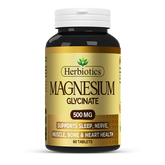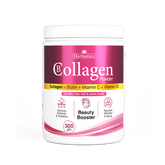What is Magnesium Vs. Magnesium Glycinate, All You Need to Know

Magnesium is an important element that the human body requires for several metabolic activities. It is essential for nerve activity, muscular contraction, energy generation, and bone health. Despite its significance, many individuals do not consume enough magnesium in their diets, resulting in possible shortages that might harm their general health.
Magnesium glycinate, a chelated form of magnesium bonded to the amino acid glycine, is one of the most accessible and well-tolerated magnesium supplements available. This type is commonly utilised in supplements due to its excellent absorption and benign effect on the digestive system.
In this article, we'll look at the distinctions between magnesium and magnesium glycinate, as well as the advantages of magnesium glycinate supplements and why they're becoming so popular among health-conscious people.
Understanding Magnesium: An Essential Mineral
The Role of Magnesium in the Body
Magnesium is the fourth most prevalent mineral in the human body and plays a key part in over 300 enzyme activities. Some of its main functions are:
- Energy Production: Magnesium is a cofactor in ATP (adenosine triphosphate) production, the body's basic energy currency.
- Muscular Function: It regulates muscular contractions and relaxation, hence reducing cramps and spasms.
- Nervous System Support: Magnesium is required for neurotransmitter function, which aids in mood and stress control.
- Bone Health: It supplements calcium and vitamin D to improve bone density and strength.
- Heart Health: Magnesium helps to regulate cardiac rhythm and blood pressure.
- Blood Sugar Control: It influences insulin action and glucose metabolism.
Common Sources of Magnesium
Magnesium may be found in a variety of foods, including:
- Leafy green veggies (spinach and kale)
- Nuts and seeds (pumpkin seeds, almonds)
- Whole grains (brown rice and quinoa)
- Legumes (black beans and lentils)
- Fish (salmon and mackerel)
- Dairy products
- Dark chocolate
Despite its presence in many foods, magnesium insufficiency is widespread as a result of poor eating habits, soil depletion, and certain medical disorders that impair absorption. This is where magnesium supplements, namely magnesium glycinate, come into play.
What is Magnesium Glycinate?
The Science Behind Magnesium Glycinate
Magnesium glycinate is a highly absorbable form of magnesium that is formed by combining magnesium with glycine, a non-essential amino acid. This chelated form increases bioavailability, allowing the body to absorb and use magnesium more efficiently.
One of the primary benefits of magnesium glycinate over other forms, such as magnesium oxide or magnesium citrate, is that it is easier on the digestive system. Many people who take alternative types of magnesium get side effects such as diarrhoea, however magnesium glycinate is significantly less likely to cause gastrointestinal upset.
Why Choose Magnesium Glycinate?
- Superior Absorption: Magnesium glycinate is one of the most bioavailable magnesium forms, which means the body absorbs it better.
- Gentle on the Stomach: It is gentle on the stomach, unlike other types, and has no digestive or laxative effects.
- Promotes Relaxation: Glycine has soothing qualities, therefore magnesium glycinate is an excellent choice for enhancing sleep and lowering stress.
- Supports Muscular and Nerve Function: Promotes muscular healing, decreases cramping, and enhances nerve function.
Magnesium vs. Magnesium Glycinate: Key Differences
When comparing magnesium with magnesium glycinate, it's vital to note that magnesium is a mineral, whereas magnesium glycinate is a type of magnesium supplement. Here are some of the major differences:
- Bioavailability: Magnesium glycinate is more easily absorbed by the body than magnesium oxide or sulphate.
- Digestive Tolerance: Magnesium oxide and citrate can induce diarrhoea, however magnesium glycinate is well tolerated.
- Specific Benefits: While all forms of magnesium promote overall health, magnesium glycinate is especially useful for sleep, stress reduction, and muscle repair due to its glycine concentration.
Magnesium glycinate supplements are a fantastic alternative for those who want to raise their magnesium levels without having to worry about stomach difficulties.
Health Benefits of Magnesium Glycinate
1. Improved Sleep Quality
Magnesium glycinate has been found to increase relaxation and sleep quality. Glycine, the amino acid in this chemical, has a soothing impact on the brain, allowing people to fall asleep sooner and sleep deeper. Supplementing with magnesium glycinate can help many people who suffer from insomnia or restless sleep.
2. Stress and Anxiety Reduction
Magnesium regulates neurotransmitters, which determine mood and stress response. Magnesium glycinate, in particular, is effective in reducing anxiety and promoting relaxation. It helps to manage cortisol levels, which are frequently increased in those who are under chronic stress.
3. Muscle Recovery and Pain Relief
Athletes and anyone who have regular muscular cramps or pain might benefit from magnesium glycinate. Magnesium aids in muscular relaxation, reducing cramps, spasms, and tension following physical exercise. It also helps to reduce inflammation and promotes muscle repair.
4. Heart Health Support
Magnesium glycinate contributes to a healthy cardiovascular system by controlling blood pressure and maintaining cardiac rhythm. According to studies, adequate magnesium consumption lowers the risk of hypertension, arrhythmias, and cardiovascular illnesses.
5. Blood Sugar and Metabolic Health
Magnesium is required for insulin action and glucose metabolism. Magnesium glycinate supplementation has been demonstrated in studies to help regulate blood sugar levels, lowering the risk of type 2 diabetes and metabolic diseases.
6. Bone Health and Osteoporosis Prevention
Magnesium, like calcium and vitamin D, is essential for maintaining bone density and strength. Magnesium glycinate aids in the normal absorption of calcium, lowering the risk of osteoporosis and other bone problems.
Who Should Take Magnesium Glycinate Supplements?
Magnesium glycinate is acceptable for many people, including:
- Magnesium Deficiency: People who do not get enough magnesium in their diet.
- Individuals with Stress and Anxiety: Promotes relaxation and reduces cortisol levels.
- Athletes and Active People: Promotes muscle healing and decreases cramping.
- People with Sleep Problems: Improves sleep quality and relaxation.
- Those with Digestive Sensitivities: A well-tolerated magnesium form that does not cause stomach issues.
Where to Buy High-Quality Magnesium Glycinate Supplements
If you're looking for high-quality magnesium glycinate supplements, Herbiotics is a reputable brand that sells excellent nutritional supplements. Their Magnesium Glycinate supplement is designed for maximum absorption and efficacy, giving the finest possible health advantages.
Final Verdict
Magnesium is an essential element for general health, and magnesium glycinate is one of the most efficient and easily absorbed forms of magnesium supplementation. Magnesium glycinate is a wonderful alternative for people trying to naturally improve their health, with advantages ranging from better sleep and stress relief to increased muscle repair and heart health.
If you're thinking about adding a magnesium supplement to your diet, magnesium glycinate can give greater benefits while avoiding the digestive difficulties associated with other forms. To properly support your wellness quest, consider a high-quality supplement such as one offered by Herbiotics.




